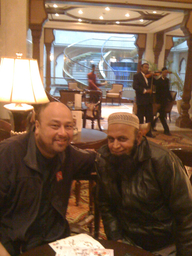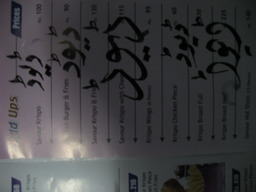Old Friends IV
 LAHORE, Pakistan
LAHORE, Pakistan
January 9, 2011
I invited my first calligraphy instructor, Junaid Sahib, to tea at the nicest place I knew in Lahore: the Avari Hotel. I am seldom a patron of 5-star hotels, myself. I figured taking tea at the Avari would be a special treat even more for Junaid. My guess was that, despite being a local Lahori, it would be the type of place he never would have set foot in.
I was already seated in the lobby sipping coffee when he called:
"Can you meet me outside the Avari?", Junaid asked.
"I'm already inside. I'm in the lobby. Come on in," I told him.
"No. There's a lot of security. They're not letting me in."
I came out to the street. I shouldn't have been surprised that Junaid hadn't made it past even the first security checkpoint. He didn't look like the kind of person who would have any business in the Avari. His beard was big, bushy, and dark. He was driving a Chinese-made motorcycle. He was wearing typical Pakistani dress--a loose, baggy shalwar-qamiz--rather than some western business suit. I felt miffed that security personnel were hassling Junaid based on his appearances: this man can write the best calligraphy I've seen.
I led Junaid in through each of the checkpoints, metal detectors, and pat-down search areas. I might not have looked the 5-star part, either, but speaking politely in English at the security guards was enough to immediately convince them to allow us inside.
We stepped into the lobby, inspected a nearby pastry case, then sat down on a pair of overstuffed chairs around a low table. At some point a violinist began playing behind us. With coffee, pastries, and music I started to feel less grumpy about the tight security.
We caught up with each other. I told him about where I've been traveling. He talked about performing the haj, from which he just returned. It was his first--and, in all likelihood, will be his only--pilgrimage. He says he has less work these days. There's no work at all coming from the newspapers now--I remember Junaid scripting out article headlines for the next day's paper back when I was his student. Most of the calligraphy he produces is no longer written by hand but composed using In Page, a software program that can output a decent version of the standard Urdu type, nastaliq.
"Who still wants calligraphy done by hand, rather than with software?", I asked Junaid.
"Book publishers. People who care how the printed product really looks. With In Page I can produce work several times faster. But it's all form with no soul."
Between the time waiters brought us our coffee and served us our food I brought out the bottle of ink and the calligraphy pen I travel with. Junaid seemed to find the fact that I take them along with me everywhere I travel amusing. He immediately picked the pen up and started writing words on a nearby napkin, getting the ink to flow.
Then, we began what I'd been hoping for, an impromptu calligraphy lesson. For some reason I felt excited to show Junaid where my abilities have come and to get his feedback. He hadn't realized that I'd carried on studying after his time as my teacher.
 I offered up the only paper I had, a take-away menu from a biryani/fast-food restaurant chain. The ink was flowing well. Junaid wrote my name in five different styles of script. Most I had studied at one time, but not all of them. I wasn't certain I could even recognize each of the different styles, but tried guessing after he wrote out my name in the final script.
I offered up the only paper I had, a take-away menu from a biryani/fast-food restaurant chain. The ink was flowing well. Junaid wrote my name in five different styles of script. Most I had studied at one time, but not all of them. I wasn't certain I could even recognize each of the different styles, but tried guessing after he wrote out my name in the final script.
"This is diwani," I said, starting from the last word he wrote.
Junaid's eyes opened wide and his head nodded.
"And the next one above is riqa." (I wasn't certain of that one.) "Then thuluth, naskh, and nastaliq."
I must have identified all five correctly as Junaid beamed at me and clapped me hard on the back.
I felt pretty pleased, myself.
 I offered up the only paper I had, a take-away menu from a biryani/fast-food restaurant chain. The ink was flowing well. Junaid wrote my name in five different styles of script. Most I had studied at one time, but not all of them. I wasn't certain I could even recognize each of the different styles, but tried guessing after he wrote out my name in the final script.
I offered up the only paper I had, a take-away menu from a biryani/fast-food restaurant chain. The ink was flowing well. Junaid wrote my name in five different styles of script. Most I had studied at one time, but not all of them. I wasn't certain I could even recognize each of the different styles, but tried guessing after he wrote out my name in the final script.
 LAHORE, Pakistan
LAHORE, Pakistan